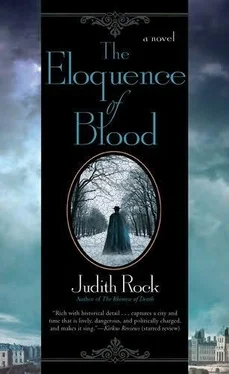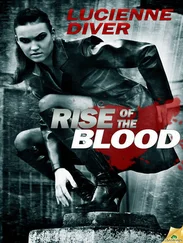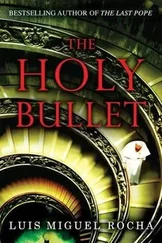Judith Rock - The Eloquence of Blood
Здесь есть возможность читать онлайн «Judith Rock - The Eloquence of Blood» весь текст электронной книги совершенно бесплатно (целиком полную версию без сокращений). В некоторых случаях можно слушать аудио, скачать через торрент в формате fb2 и присутствует краткое содержание. Жанр: Исторический детектив, на английском языке. Описание произведения, (предисловие) а так же отзывы посетителей доступны на портале библиотеки ЛибКат.
- Название:The Eloquence of Blood
- Автор:
- Жанр:
- Год:неизвестен
- ISBN:нет данных
- Рейтинг книги:5 / 5. Голосов: 1
-
Избранное:Добавить в избранное
- Отзывы:
-
Ваша оценка:
- 100
- 1
- 2
- 3
- 4
- 5
The Eloquence of Blood: краткое содержание, описание и аннотация
Предлагаем к чтению аннотацию, описание, краткое содержание или предисловие (зависит от того, что написал сам автор книги «The Eloquence of Blood»). Если вы не нашли необходимую информацию о книге — напишите в комментариях, мы постараемся отыскать её.
The Eloquence of Blood — читать онлайн бесплатно полную книгу (весь текст) целиком
Ниже представлен текст книги, разбитый по страницам. Система сохранения места последней прочитанной страницы, позволяет с удобством читать онлайн бесплатно книгу «The Eloquence of Blood», без необходимости каждый раз заново искать на чём Вы остановились. Поставьте закладку, и сможете в любой момент перейти на страницу, на которой закончили чтение.
Интервал:
Закладка:
The rector waited serenely until Damiot remembered the required reverence to his superior. Then Charles rose and offered his chair to Damiot who, as a priest, was his superior.
“Bonjour, maitre,” Damiot said hurriedly. “Thank you. With your permission, mon pere?”
Le Picart nodded and Damiot sat. Charles’s mouth twitched. Damiot was looking at the letter in Le Picart’s hand the way Charles’s boyhood beagle had watched meat roasting in the kitchen fireplace.
“From your esteemed father, mon pere,” the rector said, holding the letter out. “Read it here, please; it touches on what Maitre du Luc and I were discussing.”
“Yes, mon pere.” Damiot glanced at Charles and then was absorbed in reading. Fortunately, the letter was short. Incomprehensibly, before Damiot reached the end of it, he was laughing. Eyes dancing with mirth, he looked at Le Picart. “Incredible! Have you ever heard anything to match this, mon pere?”
“Certainly nothing financial,” the rector said dryly. He turned to Charles, who was utterly at sea. “We will tell you shortly what is entertaining Pere Damiot, maitre, but first you need to know that his esteemed father is a merchant goldsmith and a member of the Six Corps.”
“I do know from Pere Damiot that his father is a goldsmith, mon pere-but, what is the Six Corps?”
Damiot looked at Charles in disbelief.
The rector said kindly, “The association of Paris’s six most influential guilds.”
“My father is head of the goldsmiths’ guild.” Damiot looked questioningly at Le Picart, who nodded at him to continue. “It is like this, maitre. This morning, my father heard something that closely concerns Monsieur Henri Brion. He had already heard about the Mynette bequest coming to us-I think everyone in Paris has heard of it by now.” Damiot looked apologetically at Le Picart. “I hope I did not speak out of turn, mon pere, but when my father visited me yesterday, he asked me if we had sure proof of Monsieur Simon Mynette’s intention, and I told him we had Simon Mynette’s letter, notarized by Monsieur Henri Brion.”
“Continue,” Le Picart said noncommittally.
“Well, now my father has written to me because he is worried that news that has just reached him about Monsieur Brion may somehow touch us-because of the Mynette property, you understand. Are you with me, Maitre du Luc?”
“Barely.”
He leaned almost gleefully toward Charles. “What has come to light is a scheme for smuggling silver through customs. It was just uncovered at the port in Brest. This scheme has been traced to Paris, and rumor has it that our Monsieur Henri Brion is its creator.”
Le Picart lifted his hand slightly to pause Damiot. “What you do not know, Pere Damiot, is that Henri Brion left Procope’s coffeehouse on Thursday evening with a goldsmith named Bizeul and another man. Those who saw him go say he didn’t go willingly. And this morning Henri Brion was found dead.”
“No!” Damiot looked incredulously from the rector to Charles. “Is this certain?”
Charles nodded. “I saw his body.”
“Well, I can easily imagine,” Damiot said, hastily crossing himself, “that Brion’s investors may have been tempted to kill him over losing so much money because this smuggling scheme has failed. But I know Monsieur Bizeul and I cannot imagine he would do murder.”
“Why not?” the rector said sharply.
“Many reasons, mon pere. My father has known Monsieur Bizeul longer than I have been alive. And Monsieur Bizeul is a senior member of our bourgeois Congregation of the Sainte Vierge. As both my father’s son and the priest in charge of that Congregation, I have had many dealings with Bizeul. If he is not as upright and devout as I have supposed, I am badly deceived.” His face changed suddenly. “Though it is true that he recently dowered his last daughter very generously. Overgenerously, some said. Oh, dear.”
“Go back a little,” Charles said. “What is the role of investors in this scheme?”
“Ma foi! Do you understand nothing about money?”
“I’m noble, remember? We never understand anything about money. That’s why we don’t have any.”
A snort of laughter escaped Le Picart.
Damiot rolled his eyes. “You’re only minor nobility. Listen. Notaries are the middlemen in French investment schemes. We, unlike the English, have not seen fit to have a national bank, so notaries like Monsieur Brion bring together those who have money and those who need it. A notary has to know not only where money is, but who wants it and who will pay for it. And that includes things that can be turned into money, one way and another. Especially things like silver.”
“Which brings us to the details of Henri Brion’s scheme,” Le Picart said.
Damiot’s eyes were brimming with laughter. “So let me set the scene. The silver might not have been discovered, you know, Maitre du Luc, except for the drunk. And the handcart, of course.”
Deadpan, Charles said back, “Ah, yes, it always is a drunk, isn’t it? The handcart, though, figures less often.” And waited to see how much of a comic script Damiot was going to make up right there in the rector’s office.
The rector shifted warningly in his chair.
“Yes, well,” Damiot said quickly, “it seems a drunk dock workman ran the wheel of his cart into the end of a barrel lying on its side on the dock. The barrel was one of fifty full of chocolate from Mexico. The barrel’s bottom split and chocolate seeds-beans, whatever you call them-spilled out. As the drunk tried to push them back in, he felt something hard in the barrel and pulled it out. It was a pretty little bar of silver, thickly wrapped in wool. All fifty barrels turned out to be salted with these small silver bars.”
“But wouldn’t the weight of the silver in the barrel give the whole thing away?” Charles said, frowning.
“That’s why the bars were so small. And there weren’t many of them, maybe a half dozen to each barrel. But a fifty-barrel shipment of chocolate would net you enough silver-on which you’d paid only the customs charge for chocolate-to make it worthwhile.”
“Reprehensible. I’m shocked.” Charles tried to stifle his grin. He might be from the south, but he was enough of a Frenchman to enjoy a story of tax evasion. “Henri Brion thought of this? That surprises me, after all I’ve heard of him.”
“My father says the customs people think he did. And that now Monsieur Henri Brion’s investors are out a great deal of money.”
“Because the investors financed the shipment,” Charles said, finally understanding.
“Habes,” Damiot said, classroom Latin for “you have it.” “And though what they would have paid Henri Brion for being allowed into the potential profit was far less than they would normally pay for silver, it was still too much to simply lose.”
“Not to mention facing prosecution for smuggling,” Le Picart said. “A substantial enough motive for murder, if Brion refused to give them their money back. Or if they feared he would try to lighten his own penalty by giving up their names to the authorities.”
So much, Charles thought, for his certainty that there was only one killer. “Does your father say if Monsieur La Reynie knows about this?”
Shaking his head, Damiot started to say something, but the rector, whose thoughts were going in other directions, forestalled him.
“Could this scheme of Henri Brion’s have given him-Brion, I mean-a reason to kill Martine Mynette? Could he have stolen money from her and used it to promote this smuggling? While her mother was ill, perhaps?”
“I don’t know. I suppose it’s possible. But it isn’t clear yet which of them died first.”
Damiot was looking from Charles to the rector and frowning. “The police are keeping us so well informed?”
Читать дальшеИнтервал:
Закладка:
Похожие книги на «The Eloquence of Blood»
Представляем Вашему вниманию похожие книги на «The Eloquence of Blood» списком для выбора. Мы отобрали схожую по названию и смыслу литературу в надежде предоставить читателям больше вариантов отыскать новые, интересные, ещё непрочитанные произведения.
Обсуждение, отзывы о книге «The Eloquence of Blood» и просто собственные мнения читателей. Оставьте ваши комментарии, напишите, что Вы думаете о произведении, его смысле или главных героях. Укажите что конкретно понравилось, а что нет, и почему Вы так считаете.












